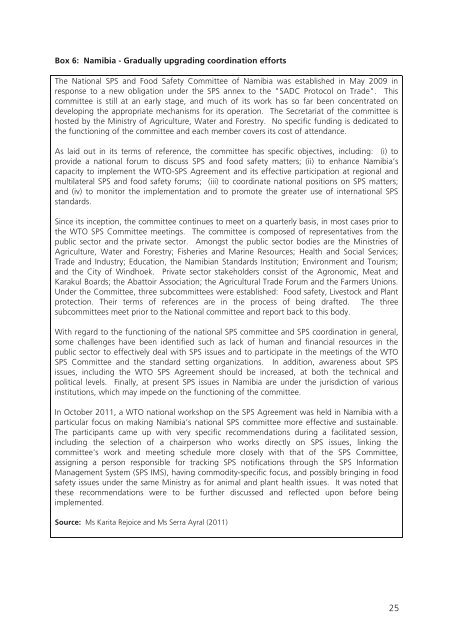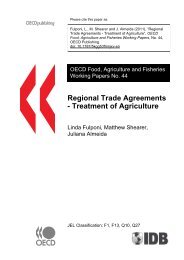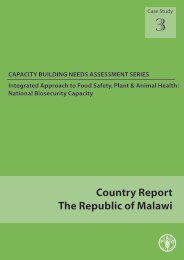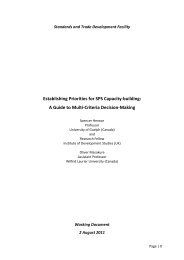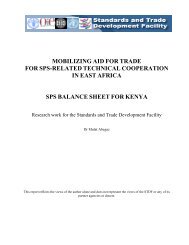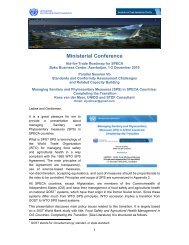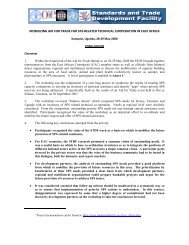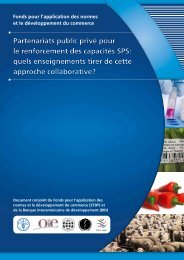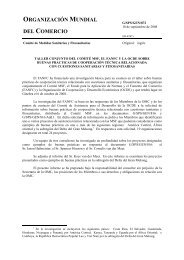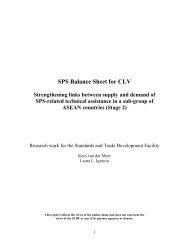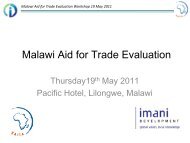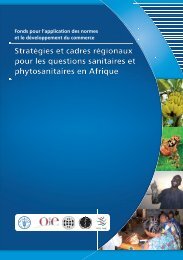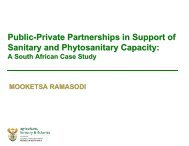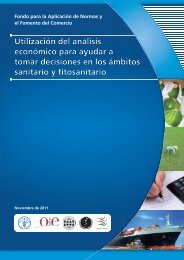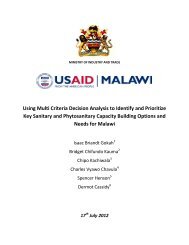National SpS Coordination Mechanisms - Standards and Trade ...
National SpS Coordination Mechanisms - Standards and Trade ...
National SpS Coordination Mechanisms - Standards and Trade ...
Create successful ePaper yourself
Turn your PDF publications into a flip-book with our unique Google optimized e-Paper software.
Box 6: Namibia - Gradually upgrading coordination effortsThe <strong>National</strong> SPS <strong>and</strong> Food Safety Committee of Namibia was established in May 2009 inresponse to a new obligation under the SPS annex to the "SADC Protocol on <strong>Trade</strong>". Thiscommittee is still at an early stage, <strong>and</strong> much of its work has so far been concentrated ondeveloping the appropriate mechanisms for its operation. The Secretariat of the committee ishosted by the Ministry of Agriculture, Water <strong>and</strong> Forestry. No specific funding is dedicated tothe functioning of the committee <strong>and</strong> each member covers its cost of attendance.As laid out in its terms of reference, the committee has specific objectives, including: (i) toprovide a national forum to discuss SPS <strong>and</strong> food safety matters; (ii) to enhance Namibia’scapacity to implement the WTO-SPS Agreement <strong>and</strong> its effective participation at regional <strong>and</strong>multilateral SPS <strong>and</strong> food safety forums; (iii) to coordinate national positions on SPS matters;<strong>and</strong> (iv) to monitor the implementation <strong>and</strong> to promote the greater use of international SPSst<strong>and</strong>ards.Since its inception, the committee continues to meet on a quarterly basis, in most cases prior tothe WTO SPS Committee meetings. The committee is composed of representatives from thepublic sector <strong>and</strong> the private sector. Amongst the public sector bodies are the Ministries ofAgriculture, Water <strong>and</strong> Forestry; Fisheries <strong>and</strong> Marine Resources; Health <strong>and</strong> Social Services;<strong>Trade</strong> <strong>and</strong> Industry; Education, the Namibian <strong>St<strong>and</strong>ards</strong> Institution; Environment <strong>and</strong> Tourism;<strong>and</strong> the City of Windhoek. Private sector stakeholders consist of the Agronomic, Meat <strong>and</strong>Karakul Boards; the Abattoir Association; the Agricultural <strong>Trade</strong> Forum <strong>and</strong> the Farmers Unions.Under the Committee, three subcommittees were established: Food safety, Livestock <strong>and</strong> Plantprotection. Their terms of references are in the process of being drafted. The threesubcommittees meet prior to the <strong>National</strong> committee <strong>and</strong> report back to this body.With regard to the functioning of the national SPS committee <strong>and</strong> SPS coordination in general,some challenges have been identified such as lack of human <strong>and</strong> financial resources in thepublic sector to effectively deal with SPS issues <strong>and</strong> to participate in the meetings of the WTOSPS Committee <strong>and</strong> the st<strong>and</strong>ard setting organizations. In addition, awareness about SPSissues, including the WTO SPS Agreement should be increased, at both the technical <strong>and</strong>political levels. Finally, at present SPS issues in Namibia are under the jurisdiction of variousinstitutions, which may impede on the functioning of the committee.In October 2011, a WTO national workshop on the SPS Agreement was held in Namibia with aparticular focus on making Namibia’s national SPS committee more effective <strong>and</strong> sustainable.The participants came up with very specific recommendations during a facilitated session,including the selection of a chairperson who works directly on SPS issues, linking thecommittee's work <strong>and</strong> meeting schedule more closely with that of the SPS Committee,assigning a person responsible for tracking SPS notifications through the SPS InformationManagement System (SPS IMS), having commodity-specific focus, <strong>and</strong> possibly bringing in foodsafety issues under the same Ministry as for animal <strong>and</strong> plant health issues. It was noted thatthese recommendations were to be further discussed <strong>and</strong> reflected upon before beingimplemented.Source: Ms Karita Rejoice <strong>and</strong> Ms Serra Ayral (2011)27 25


